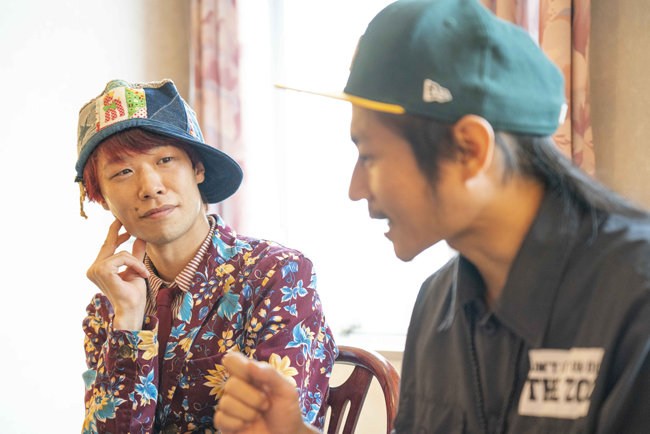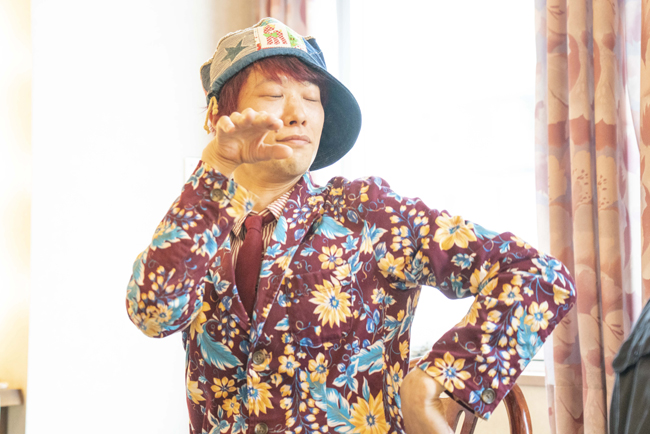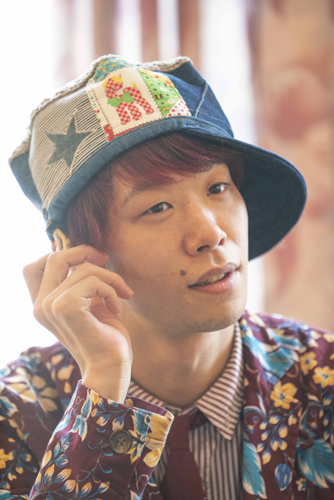
ASIA HUNDREDS is a series of interviews and conference presentations by professionals with whom the Japan Foundation Asia Center works through its many cultural projects.
By sharing the words of key figures in the arts and cultures in both English and Japanese and archiving the "present" moments of Asia, we hope to further generate cultural exchange within and among the regions.
Nikii × Takuro Suzuki
Dance that has its origins in everyday life - their personal stories
Atsushi Kosugi (hereinafter Kosugi): Maybe we could start by talking about your first encounters with dance.
Nikii: My first experience of dance was when I was in the first grade at primary school. We had to choose two dancers from our class for a school event, and I won in the lucky draw. I thought I would be able to dance, but once I walked onstage I couldn't dance at all. I could do nothing but just stand there while the music was playing (laughs).
Takuro Suzuki (hereinafter Suzuki): (Laughs). There are lots of children like that in Japan too. In the school setting these are the kids who tend to be labelled as "incompetent children", but from a different point of view, I don't think that's necessarily the case. It may just be that they couldn't dance because they were distracted by something else. So it's important that adults who really understand are there to observe them as you never know where the chances lie.
Nikii: Yes, I agree.
Suzuki: When something like that happens, I try to ask, "What were you thinking?" instead of "Why don't you dance?" So when was your next encounter with dance?
Nikii: After that I learned how to dance while I was watching music programs on TV at a neighbor's house. In the fourth grade I became a member of a dance group run by a relative of mine. It was when my group participated in a competition that I was recruited.
Suzuki: So that was how it all happened! The person who recruited you must be important to you.
Nikii: Yes, that person is very important to me. I joined the group that she organized and took part in many competitions until I was in the first grade at junior high school. We must have won about 30 times. It wasn't only competitions though. I was also in shows, singing or acting as MC onstage. I was half forced to do all sorts of things (laughs). I would earn 500 baht if I danced three pieces in a show. That's just a little under 2,000 Japanese yen. I was earning some money, although not that much, so I don't think I was too much of a burden to my parents.
Suzuki: I see. From what you are saying, it seems as though there is quite a big difference in the way in which dance is perceived when you compare Thailand and Japan. "How much you can earn for one dance" is not something that I had thought about before.

Nikii: In Thailand you have a party when you buy a new house, for instance. Also during Songkran, the New Year festival, events are held in temples in rural areas. So there are quite a few opportunities for you to dance. I was often invited to these places to perform my show.
Suzuki: In Thailand are there many events where people get together in private?
Nikii: I think you can say so. Not only dance shows but also concerts using antique instruments were popular, so I practiced and played those instruments as well.
Suzuki: By the way, I heard that other dancers often come to you and ask, "I've been offered such and such a job. How much do you think I should charge for it?" You must have a very good payment system in the dance industry. It made me wonder how many dancers in Japan think about how they should be remunerated for their performances.
Nikii: I believe that you should be rewarded accordingly for what you do and use that money to broaden your horizons.
Kosugi: What Nikii san is saying gives us the impression that in Thailand, street dance is connected in everyday life even to those who are not dance fans. How about Japan? What is the situation of street dance in Japan?
Suzuki: Nowadays in Japan as well, there are many opportunities for us to encounter street dance. Even actors need to be able to dance so that their field of activities is not restricted. In that sense I think that we are seeing more situations where dance is required. Working with Nikii right now, I feel that hip-hop is especially catchy with a lot of famous artists, and it's a genre that easily connects with the media. So it's recognizable by the general public. It has even been introduced in classes at school. In comparison with hip-hop, the word "contemporary" sounds difficult to begin with (wry smile). You're bound to think, "What in the world is contemporary dance?" So I think it's an interesting experiment for someone like myself to join a project to make street dance into a theater performance, since helping the general public to become more familiar with dance is one of my challenges.
Kosugi: When was your first encounter with dance, Suzuki san?
Suzuki: Like Nikii, I first came across dance when I was in primary school. In one of the Crayon Shin-chan movies, (Crayon Shin-chan: The Hidden Treasure of the Buri Buri Kingdom 1994), there was a dance to summon the genie (laughs). It was a funny dance, and I used to copy it.
Nikii: What was it like?
Suzuki: It was like this (he dances).

Nikii: (Laughs)
Suzuki: If you dance correctly the genie appears (laughs). So I always think that there is a purpose to dance. I know there are dances that are not like that, but the first dance for me had a purpose to it, which I liked. It was what made me think, "Nothing will happen if you don't move. In order to move, your body is important." Now I am thinking how I can communicate this message through the medium of dance. This sense of movement is definitely something that you feel not only when you dance but also in your everyday life.
Nikii: What you are saying reminds me that I have thoughts that are similar to yours. My activities as a dancer are partly based on my ambition to become famous, to become well known by others. Having said that, there was a time when I forgot about that goal and went off the rails.
Suzuki: So you went through a difficult time?
Nikii: Yes, although I was still dancing in clubs. Then one day I suddenly realized, "Maybe I had forgotten what dance is really about," and returned to the manager who had recruited me years ago. She said to me, "My son has come home," and I cried. That day I danced all 60 dance pieces of the team from the beginning, and I couldn't get up the next morning (laughs).
Suzuki: What a great story (Laughs)! After that you did ballroom dancing at university, didn't you?

Nikii: Yes. When I once went to a nightclub, I happened to see a man and a woman dance together on their first meeting. I thought to myself, "Why are these two able to dance so well together on their first meeting?" and became interested, so I joined a group at university to learn ballroom dancing. At first it was just an extracurricular activity for me. I didn't even know that there were ballroom dancing competitions. After taking lessons for a month, I reached the highest level possible in the youth category. Then the mother of one of the girls in my class asked me if I wanted to practice with her daughter. I lived with the family for about a year to concentrate on practicing. Since I was going to dance with her daughter, the mother took care of all my outfits and shoes. In competitions we danced for the province and went on to represent the country. The family never told me the details, so I didn't even know that we had become the representatives of Thailand (laughs). After that I came to the realization that my true passion was hip-hop, so I gave up ballroom dancing.
Suzuki: Nikii, you started off with hip-hop and went on to experience ballroom dancing and other things, but then came back to hip-hop. For me it was the dance from Crayon Shin-chan that sparked my interest in dance, and that was probably contemporary dance, although it's hard to say what genre it belongs to (laughs). So I think it's true to say that you come back to what you liked in the first place. Nikii, you entered the world of ballroom dancing based on your query, "Why are people able to dance together on their first meeting?" I think you made quick progress because your goal was aimed at finding the answer to your question. By having your own point of view about something and investigating it further, you not only develop more quickly but also notice straightaway if it's not what you are aiming for. In my case, I was in theater during my university years based on my belief that I talked about before: "You cannot achieve anything without moving your body." The reason I moved on to dance was that I realized that I didn't like saying my lines just standing onstage. I preferred performing in plays where you move around, letting out energy, as opposed to plays where you exchange lines in a matter-of-fact way. That realization led me to think, "That's it! It's the body! It's dance!" I talked about this to Yukio Ninagawa, my teacher at the time, who said, "Yes, I think dance suits you better than acting," and I remember thinking, "That's exactly what I thought!"
Nikki: (Laughs)






